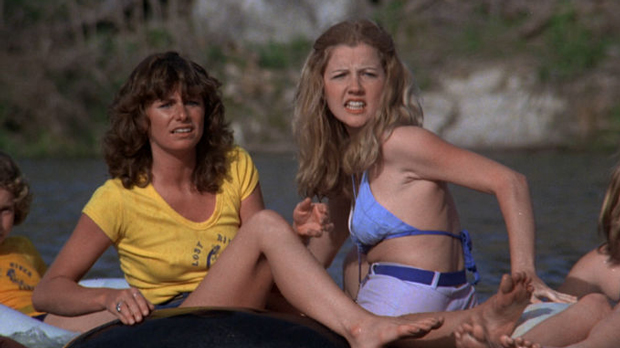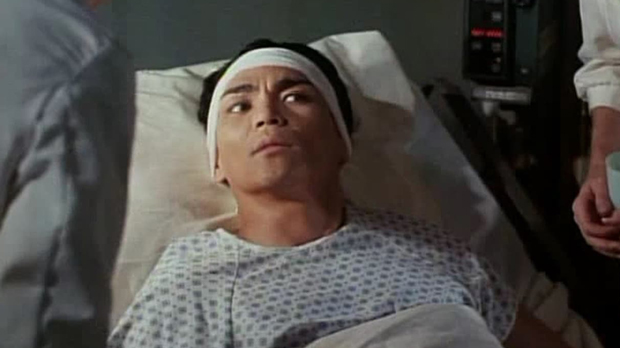
Pennies from Heaven (1981) MGM/Drama-Musical RT: 108 minutes Rated R (language, sexual material, brief nudity, mature themes) Director: Herbert Ross Screenplay: Dennis Potter Music: Marvin Hamlisch and Billy May Cinematography: Gordon Willis Release date: December 18, 1981 (US) Cast: Steve Martin, Bernadette Peters, Jessica Harper, Christopher Walken, Vernel Bagneris, John McMartin, John Karlen, Jay Garner, Robert Fitch, Tommy Rall, Eliska Krupka, Frank McCarthy, Raleigh Bond, Gloria LeRoy, Nancy Parsons. Box Office: $9.1M (US)
Rating: ****
Pennies from Heaven might be the most misunderstood film of the late 20th century. No, let’s change that to it is. A lot of it has to do with the leading man Steve Martin. At the time, he was best known as the “wild and crazy guy” that cracked people up with his wacky comedy routines (e.g. “King Tut”). He was fresh off the success of his hit comedy The Jerk (his movie debut) when he was hired to play the lead in the film adaptation of the six-episode BBC miniseries. Audiences showed up expecting Martin to do his usual schtick. They weren’t expecting to see him in a dramatic role. They were naturally put off. Word got around it wasn’t a comedy and people stayed away in droves. It bombed badly earning only $9.1M against a $22M budget.
The other problem is people just didn’t get it. Pennies from Heaven is a musical, but not in the traditional sense. It’s what I call an anti-musical. It subverts the genre by contrasting big splashy musical numbers with the grim realities of the Depression. It’s not a feel-good affair either. It won’t leave you with a song in your heart or a dance in your step. It’s the complete opposite of the light-hearted 30s musicals its paying homage to. Fred and Ginger, even though it includes scenes from one of their films (i.e. Follow the Fleet), would never have made a movie like this. Astaire reportedly hated it, describing it as “miserable” and “cheap and vulgar”.
Additionally, none of the actors actually sing. Instead, they lip-synch to popular songs of the era. Admittedly, it’s kind of jarring at first, hearing the voices of Astaire, Bing Crosby and Arthur Tracy coming out of the mouths of the actors, but it clicks once you get used to it. It’s actually rather brilliant. On the other hand, the dancing is the real thing. Martin spent six months learning to tap dance in preparation for his role. He’s quite good.
Pennies from Heaven is the brainchild of Dennis Potter who adapted his own work for the big screen, changing the setting from London to Chicago to accommodate American audiences. The task of directing it was put into the capable hands of Herbert Ross whose resume includes Funny Lady, The Sunshine Boys, The Turning Point and The Goodbye Girl. While I can’t compare it to the BBC version (didn’t see it), I can say Ross hits all the right notes and doesn’t miss a step. It’s among his finest work.
Martin plays Arthur Parker, a sheet music salesman subject to flights of fancy when real life gets too grim. Let me tell you, this guy’s life is a real downer. He’s stuck in an unhappy marriage to Joan (Harper, Shock Treatment), an uptight and frigid woman who doesn’t understand him at all. She won’t give him the money she inherited from her father to realize his dream of opening his own record store. He’s a dreamer who finds happiness only in his fantasies, typically the kinds of glitzy musical numbers you’d see in a Busby Berkeley production. When he’s refused a loan at the bank, Arthur and the banker (Garner, Buck Rogers in the 25th Century) burst into an elaborately choreographed number (“Yes! Yes!”) featuring rows of tap-dancing chorus girls in sparkly costumes and lines of men in top hats and tails. It’s an amazing scene.
Reality becomes a little brighter for Arthur when he sees Eileen (Jerk co-star and real-life romantic partner Peters) for the first time. He’s instantly taken with her, an emotion he expresses through song (“Did You Ever See a Dream Walking?”). She’s a lot like him in that she too escapes into fantasy musical numbers to escape her bleak existence as a rural schoolteacher who still lives at home. Arthur declares his love for Eileen and they have sex. He then leaves her to return home to his wife. It’s the beginning of a downward spiral marked by an unwanted pregnancy, forced prostitution and a murder for which Arthur is falsely accused. Unlike the musicals Arthur and Eileen love so much, a happy ending isn’t in the cards…. or is it?
I remember going to see Pennies from Heaven with my dad and little brother on New Year’s Day 1982 at the City Line Theater. Much to my annoyance and embarrassment, Dad forced us to walk out because he deemed it inappropriate for us. I was pissed to say the least. I didn’t get to see the whole thing until I convinced my then-girlfriend to let me watch it on cable at her house a year later. I liked it, but I didn’t really get it until I rewatched it about ten years later (summer ’92). I made a VHS copy that I must have watched about a dozen times before university resumed in the fall. I felt like a member of an exclusive club made up of people who really understood the film.
The musical numbers, choreographed by Danny Daniels, are incredible. I have a few favorites starting with the aforementioned bank number. Another great one takes place in Eileen’s classroom which transforms into an all-white set with little pianos in place of the desks. The kids, all clad in white suits and dresses, play instruments and tap-dance on the desk pianos while Peters sings/synchs “Love Is Good for Anything That Ails You”. The real show-stopper, however, is Christopher Walken (The Deer Hunter) in his one scene. He plays a pimp named Tom. By way of seducing Eileen into her sordid new career, he does a striptease while singing/synching “Let’s Misbehave”. WOW! That guy can dance! That’s when I learned Walken was a trained Broadway actor. I’m also fond of the scene where Martin and Peters take the place of Fred Astaire and Ginger Rogers (“Let’s Face the Music and Dance”) while watching Follow the Fleet at the cinema. Filmed in gorgeous black and white, it looks amazing.
The cinematography by Gordon Willis is masterful and gorgeous. He perfectly captures both the bleak reality of the era and the bright fantasy life of the protagonist. The juxtaposition of the two is a ride in that the joy one gets out of the musical numbers comes to a sudden end with a startling emotional crash. Ross handles this balancing act like the pro that he is. I love how Willis recreates famous paintings- most notably, Edward Hopper’s “Nighthawks” and “New York Movie”- as tableaux vivants (French for “living pictures”). It’s a nice touch.
The cast does a marvelous job. You’d never know it, but Martin has serious dramatic chops. He takes chances as an actor too, especially in playing an unlikable SOB who treats the women in his life horribly. That he does so convincingly is a testament to his range. Peters is sweet and heartbreaking as the fallen woman Eileen, a believer in love who stands by her louse of a man. Harper crushes it as the unhappy wife scared by Arthur’s sexual urges. Walken is simply GREAT!
HOWEVER, the most interesting character in Pennies from Heaven is the unnamed hobo played by avant-garde theater director Vernel Bagneris. It might seem like he’s of little importance to the story, but that’s simply not so. Here’s how I see it. It’s no coincidence that Arthur picks him up hitchhiking. It was meant to happen. The hobo, a street musician who plays hymns on the accordion for spare change, is an angel sent by God to observe Arthur. When he commits the sin of infidelity, he punishes him by committing the murder that Arthur is ultimately accused of. That would also explain the opening and closing shots.
It’s not the easiest film to watch, but Pennies from Heaven is definitely a rewarding and unforgettable viewing experience. There’s so much to it. I can see why audiences stayed away. It was a movie ahead of its time. If you tried it then and didn’t like it, I recommend you give it another shot. You might just like it now. Or maybe not. Like all art, it’s subjective. Me, I LOVE IT!





